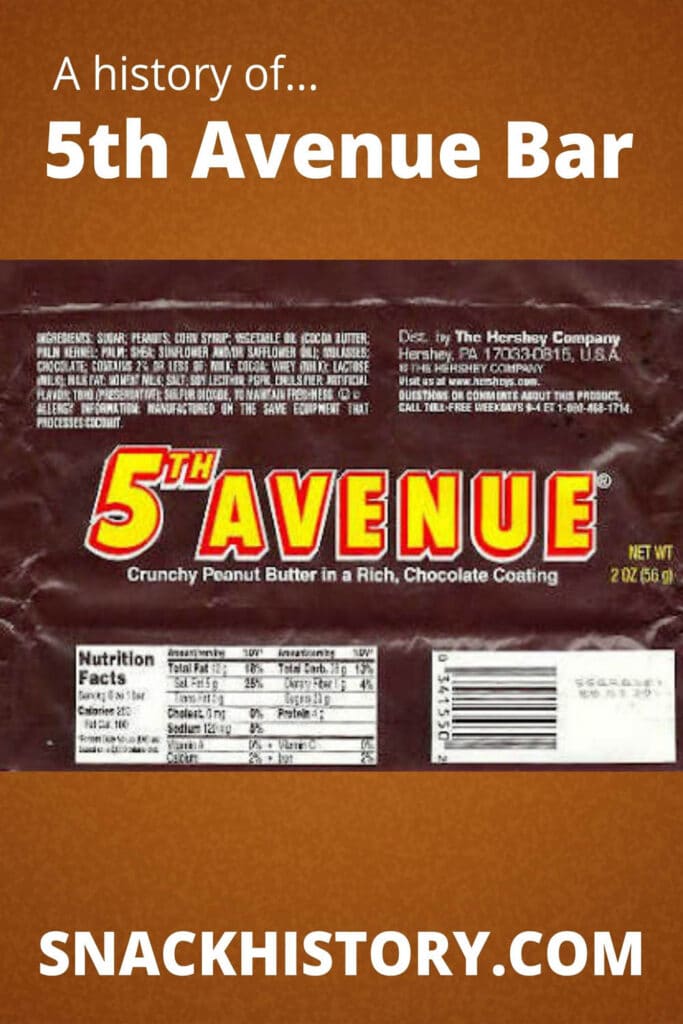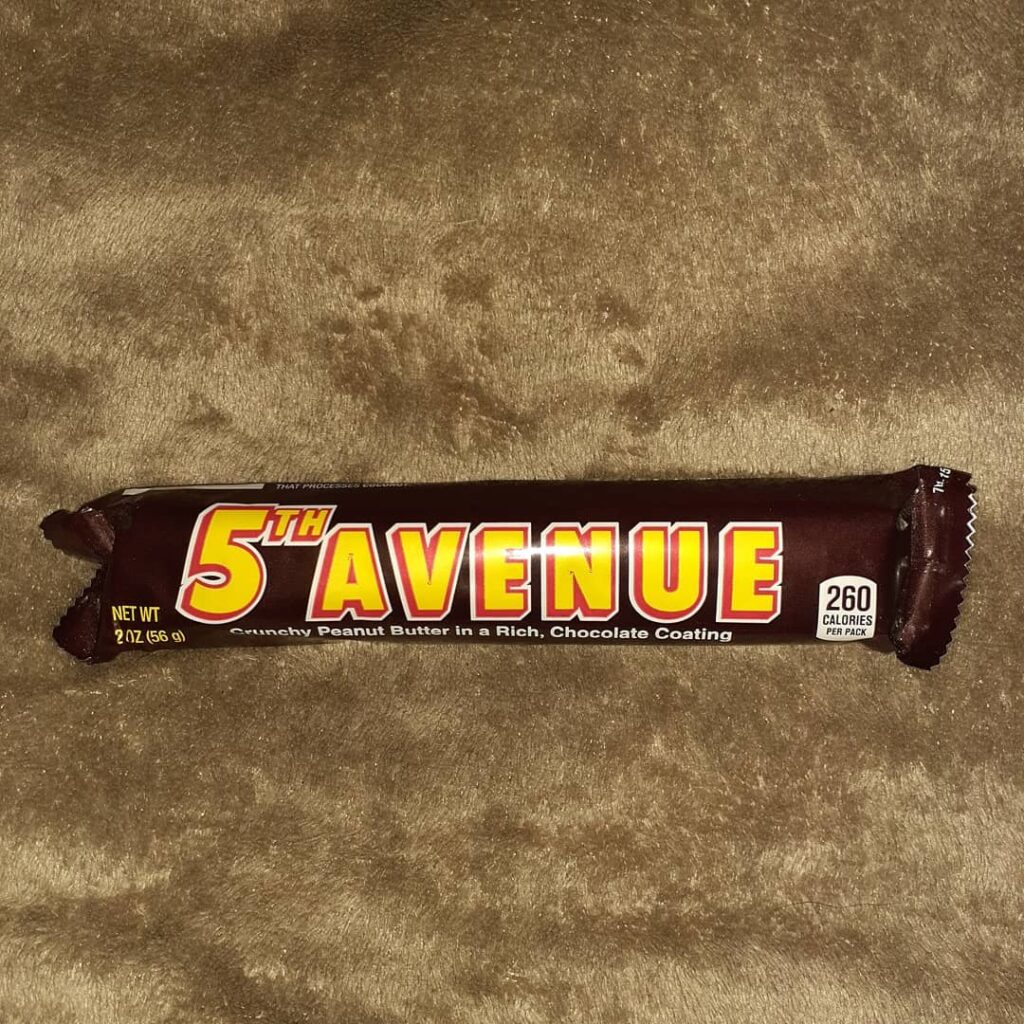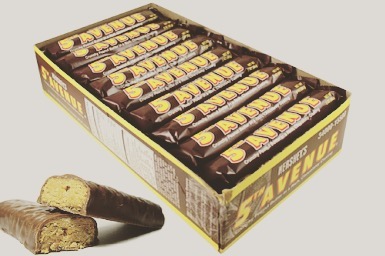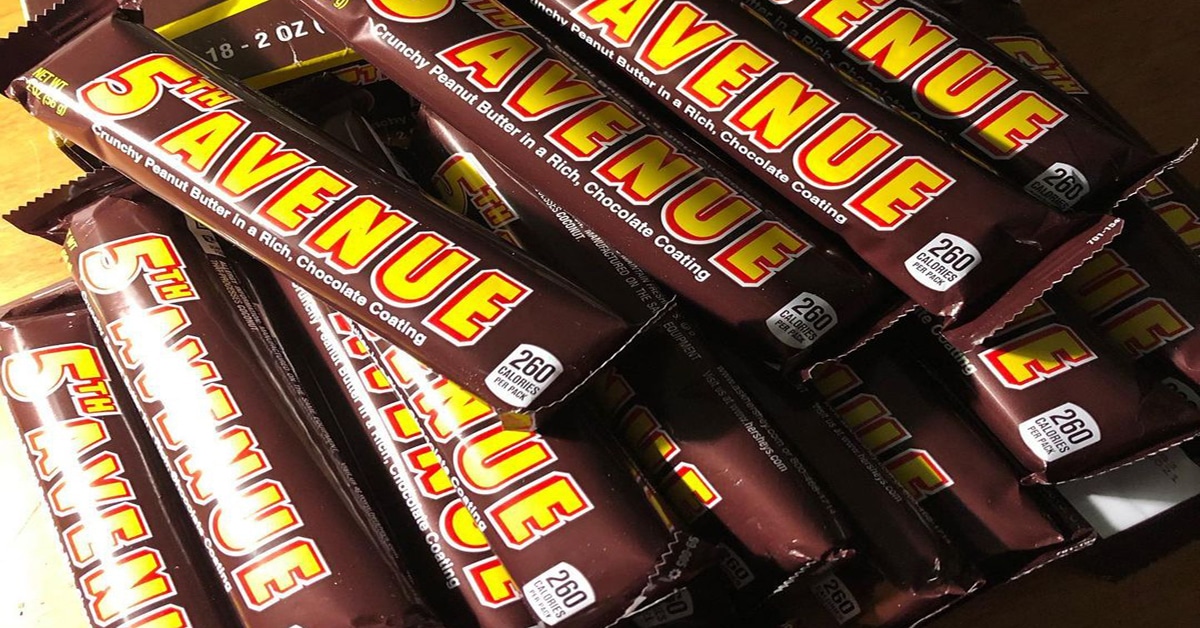5th Avenue Bar (History, FAQ & Pictures)
5th Avenue is a candy bar that was first invented in the year 1936. It is a brown-colored and rectangular-shaped candy bar, made of milk chocolate and containing crunchy peanut butter on the inside. The 5th Avenue bar is crunchy and tastes strongly of chocolate and peanut butter. The original 5th Avenue bar had almonds on the top of the candy bar and made use of cardboard boxes with tan and red coloring to hold the candy. In more recent times, the 5th Avenue brand has made use of mostly brown packaging, with red and yellow lettering. You can learn more about the 5th Avenue bar on this page, or buy it, by reading below.

History and Information
5th Avenue is a candy bar made with milk chocolate and peanut butter and has a skinny rectangular shape. First made in the year 1936, the 5th Avenue bar is produced by The Hershey Company as of 2019. The original 5th Avenue bar was invented by William H. Luden and was said to have a crispy crunchy peanut butter center with creamy milk chocolate outside.
Please leave a review or any memories of this snack in the comments at the bottom of this page. Thank you!
William Luden was recognized as one of the Candy Hall of Fame’s winners as his years of success were noted by the national confectionery sales association. His efforts were appreciated for contributing to the numerous 30s candy and success that his name has brought to the global confections business. The flavors inside of the 5th avenue bar created by Luden are stated to have had a toffee and molasses flavor. The very first original 5th Avenue bar also included a few almonds on top, which are no longer one of the ingredients of the 5th Avenue candy bar as of 2019.
The original version of the 5th avenue bar that included almonds had roasted peanuts, crushed molasses, milk chocolate, and topped with toasted almonds. The original 5th Avenue candy bar with almonds can be seen featured in an Ad in 1965, Life magazine, as it displays the candy bar’s delectable ingredients. Along with a caption, “Well, if you followed directions carefully, you should have a Fifth Avenue Candy Bar”. It has been suspected that production was greatest during the World War 2 era because 5th Avenue Bars were used by the military.
Founder William H. Luden operated his confectionery as early as 1879. In 1936, William Luden, one of the creators of the cough drops, created the 5th Avenue candy bar. He also said that the name for the candy bar can be traced to H. Earl Erb, a Luden’s secretary-treasurer who helped develop the bar and who lived at the corner of Fifth Avenue and Chestnut street.
Although the 5th Avenue Bar is known to be introduced in the year 1936, much speculation has been made in regards to where 5th avenue got its name from. William H Luden was a mere twenty years old when he started his candy company. Initially, Luden was the sole employee and started his business at 35 N. Fifth Street. He was seen as a hard-working man who wanted to sell quality products at an affordable price.
In 1986, Luden’s brand was up for sale and although not submitted for public knowledge, it has been claimed that he may have received offers worth $80 million. Hershey’s corporation had bought the Luden brand and not long thereafter demolished 7 of 9 Luden buildings, and finally sells the Luden brand to Pharmacia, which then gets transferred to Johnson & Johnson.
In September 1982, Luden’s Inc. received the City Council’s permission to hang “5th Avenue” street signs in the colors and general shape of the candy bar along 5th street. The Luden’s brand was sold off in 2001 to the Hershey’s company, which had bought the firm in 1986 and still made candy at the location for a time.
The Year 5th Avenue Was Invented
5th Avenue was invented in the year 1936 and was first made in the United States. The company that made 5th Avenue was acquired already by this time, by Food Industries of Philadelphia, a holding company owned by the Dietrich family.
The Inventor Of 5th Avenue Bar
The inventor of the 5th Avenue candy bar is William H. Luden, as the developer of the menthol cough drop, and founder of the Luden’s company and brand, Luden launched a backroom candy business in 1879 in the rear of his father’s jewelry shop at 35 N. 5th St. in Reading, Pennsylvania.
The Company That Own 5th Avenue Bar
The 5th Avenue bar is owned and made by The Hershey Company; Often called just Hershey, the company is an American multinational company and one of the biggest chocolate manufacturers in the world as of 2019. The Hershey Company owns snacks and candy such as Take 5, Twizzlers, the Hershey Bar, and the company also produces Rolo within the U.S as of 2019.
Logo

Stores That Sell Whoppers
Here is a list of some stores that may sell Whoppers
- ShopRite
- Walmart
- Walgreen’s
- Rite Aid
- Sam’s Club
Packaging Style
5th Avenue candy has a brown-colored packaging, with yellow letters that are outlined in the color red. The 5th Avenue bar uses block-styled letters for its name that are displayed on the candy bars packaging. The name of the candy is centered on the packaging, and the words “Crunchy Peanut Butter in a Rich, Chocolate Coating”, are displayed under the candy bar’s name. The overall color of the packaging is brown, and the packaging itself is rectangular shaped, like the candy bar itself. 5th Avenue candy also has come in a square-shaped box that has a similar packaging design to the wrapper the 5th Avenue candy bar comes in.
Older versions of 5th Avenue candy bar display boxes are mostly brown in color and have a rectangular shape. Red or brown colored rectangles were shown to symbolize 5th Avenue candy bars that were inside the boxes. Each one of these rectangles that depicted a candy bar had the words 5th Avenue with almonds. On the side of these boxes the words “Milk Chocolate With Almonds”, and, “Crunchy peanut butter center” were printed. An older square-shaped box that contained 5th Avenue candy bars had a picture of a city and people printed on it and had the words Fifth Avenue printed on the center of the box.
5th Avenue Candy Bar Vs Clark Candy Bar
The 5th Avenue bar has been described as being much like the Clark Bar. The Clark Bar has chocolate and peanut butter, and so does the 5th Avenue bar. Both candy bars are described as having a crispy and crunchy peanut butter center. One person described not even noticing eating the wrong candy bar after picking the 5th Avenue bar to eat instead of the Clark bar.
Ingredients
Here are the ingredients of 5th Avenue Candy Bar.
- Sugar
- Peanuts
- Corn syrup
- Vegetable oil
- Cocoa butter
- Palm kernel
- Palm
- Shea
- Sunflower and/or safflower oil)
- Molasses
- Chocolate
- Contains 2% or less of: milk, cocoa, whey (milk), lactose (milk), milk fat, salt, soy lecithin, pgpr, emulsifier, artificial flavor, tbhq (preservative), sulfur dioxide to maintain freshness
Nutrition
| Serving Size: | 1 bar snack size (16g) | % Daily Value* |
| Amount Per Serving | ||
| Calories from Fat | 35 | |
| Calories | 77 | |
| Total Fat | 3.8g | 6% |
| Saturated Fat | 1.1g | 6% |
| Cholesterol | 1mg | 0% |
| Sodium | 36mg | 2% |
| Potassium | 56mg | 2% |
| Total Carbohydrates | 10g | 3% |
| Dietary Fiber | 0.5g | 2% |
| Sugars | 7.6g | |
| Protein | 1.4g | |
| Vitamin A | 0.2% | |
| Vitamin C | 0.1% | |
| Calcium | 1.2% | |
| Iron | 1.1% |
- Percent Daily Values are based on a 2000 calorie diet.
Pictures


More Candy To Check Out
Rolo is a brand of small chocolate caramel-filled candies that are shaped like a cone. Read more about Rolos here, such as their history and where to buy them!
5th Avenue is a candy bar that is made of chocolate on the outside and peanut butter on the inside. Learn more about the 5th Avenue bar, or buy it, by reading this page.
The 100 Grand Bar is milk chocolate, caramel, and crisped rice confection. Read here to learn more about the 100 Grand Bar, or to buy it.
Almond Joy is a candy bar that replaced the Dream Bar. It consists of almonds, coconut, and milk chocolate. Learn more at Snack History.

My name is Brianna and I love writing on all topics. Candy history fascinates me and I am passionate about sharing my love of this topic with everyone else!
Please leave a review or any memories of this snack in the comments below. Thank you!
Click here for a full A-Z list of Snacks and Candy

Put the almonds back in 5th ave. So it won’t compete with butter fingers candy bar, same thing, at least 5th ave. Had the almonds, that’s the differ.
The 5 th avenue candy bar is nothing like a Clark candy bar. 5 th Avenue has a richer peanut butter taste and the chocolate is creamier. Clark bars are good but they take a back seat to a 5 th Avenue bar
There’s no 5avenue bars in any stores why I can’t even buy them at the Hershey candy store and I worked for Hershey for 31 years how come we can’t get them
I was wondering this too but they finally had them restocked at my little station today!
I wish they would put the whole almonds back on the candy bar, just like the old days. I loved them and now I don’t but the 5th avenue candy bar. Please bring it back. Ralph Casaus, New Mexico.
I have been buying 5th ave before 2019 they had no almonds on them yet they say they stoped putting them on in 2019 what’s the truth here?
I had the original Ludens 5th Ave. bar a a kid growing up in the 1960’s and I can tell you today’s Hershey’s 5th Ave. tastes nothing like the Ludens.
The Ludens bar. Had a richer peanut butter taste!
Today’s bar is to sugary with no rich peanut butter taste. The almonds on top were a real treat too!
If I could make the original bar…. No one would buy the cheap Hershey’s imitation is the 5th Ave bar.
The price that you charge for your products is absurd!!! I am going to stop using HERSHEY made products because of their corporate GREED. It is why the world is in the chaotic state that it is. Corporations like these have to be broken up!